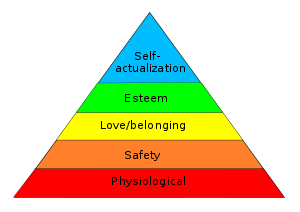Schopenhauer said in the early 19th century that the most inner drive in humans is the will to live. A generation later, Nietzsche challenged this statement, and said the most inner drive in humans is the will to power.
That seems to be true… but it got me thinking.
My understanding on human motivations is firmly based on Maslow’s hierarchy of needs.
But then, if Maslow’s theory on human drives is fundamentally true, then why is power not mentioned at all in it?
[If anyone well educated in psychology and philosophy can give me some pointers, please do.]
My first thought is that power is a tool to achieve the goals set on the levels of the pyramid. That’s a comforting thought… It means that power is not a fundamental drive, just a tool – and that paints a better picture of humanity than if it were the other way around. Following on this thought, I ask myself: is power equally useful on all levels of the pyramid? I somehow question the idea that power is useful to gain love. I doubt even more that power is useful for self-actualization. I came to this hypothesis: power is more useful on the lower levels, and less and less useful as you go up. I need to think more about this…
My other thought was that power is actually present in the pyramid, it is just called differently. In my interpretation, by power Nietzsche meant the level of esteem. Achievement, ambition, and the striving to reach the highest possible position in life – these are all manifestations of the will to power. This is interesting too… if we believe that the will to power is truly fundamental, then we need to rearrange the levels in the pyramid. It means that the level for esteem goes down to the bottom. It means that esteem is more fundamental than food or love. When poor homeless people refuse to accept food stamps we see supporting evidence of this hypothesis.

